#Shan gudao
Text
I love this moment.


Abusive people, especially parents, usually try to drag you into a spiral of self-loss, when you yourself begin to feel that by fighting them off you are losing your dignity and betraying your values. A similar fate could await Fang Duobing.
But he makes just one bow to his biological father. As if to say in this way: “I appreciate the life you gave me. But all your merit in this life is worth one bow. Only one bow - and that’s all between us.”


After going through an idol image crisis with Li Xiangyi, Fang Duobing grew up to be a truly strong person.
77 notes
·
View notes
Text
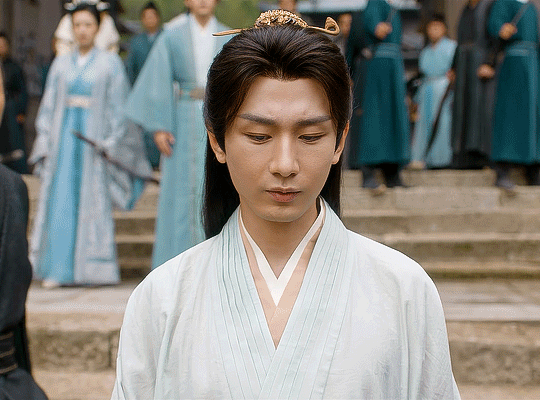
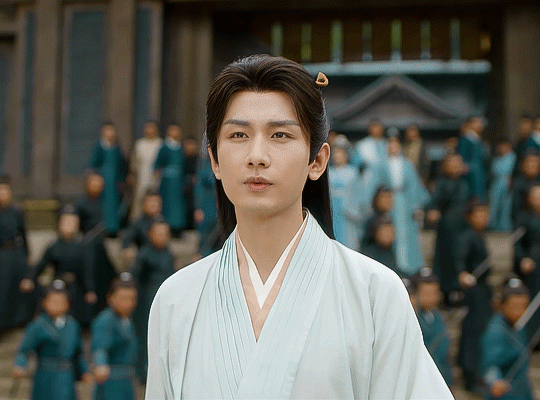
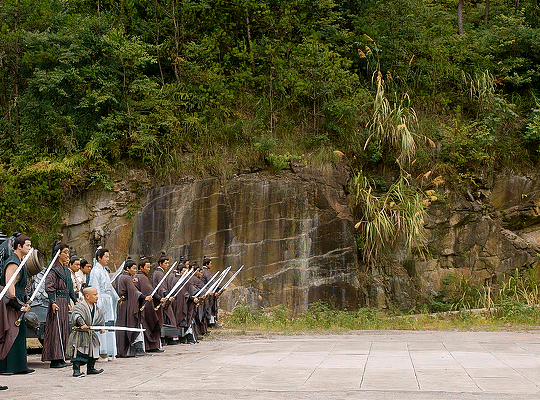

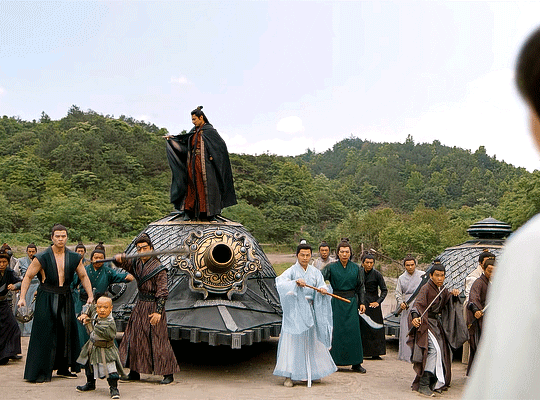
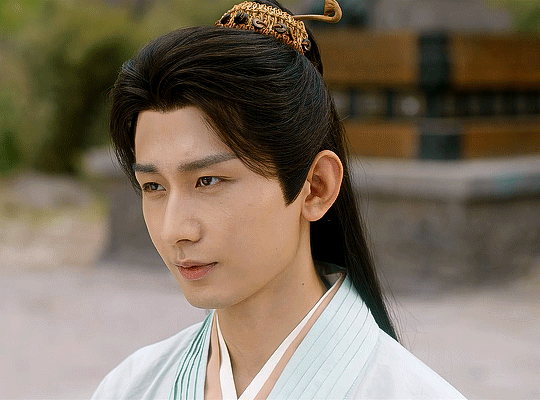
“Shixiong. Long time no see.”
Mysterious Lotus Casebook 莲花楼 | Episode 33
#userdramas#mysterious lotus casebook#cdramaedit#cdramasource#mlcedit#li xiangyi#li lianhua#shan gudao#*mine#useryd#lextag#uservivs#userginpotts#userhanyi#roserayne#tuserjade#swiftletinthecloud#usergooseras#mlc spoilers#<- look at me remembering to tag this bc i don't want a specific person to see
295 notes
·
View notes
Text
idk if anyone has written about this before but there's this big parallel/foreshadowing in terms of wang fu and fang duobing's biological fathers. specifically I'm thinking about this line from fang duobing in episode 2:
"you've not once thought of wang fu for over 10 years until you killed your witness and finally remembered the son you abandoned. what a great father you are. you only want to prop him up to be used to keep this soulridge order in the palm of your hand."
this is almost word for word what shan gudao did with fang duobing — only remembering him and offering him power when it was convenient and helped his overall plan. additionally, both xin lei and shan gudao hid their identities and wormed their way into established organizations (the soulridge order and jinyuan alliance respectively) with plans to betray the leader and seize power
i didn't catch this on my first watch but i'm guessing it was meant as a hint for when we learn shan gudao is fang duobing's bio dad and when it's clear shan gudao isn't quite who li lianhua remembered him to be
(credits to ruiconteur for the translation)
59 notes
·
View notes
Text
There was a post about a ship between Li Xiangyi and Shan Gudao and this is what i picture in my mind
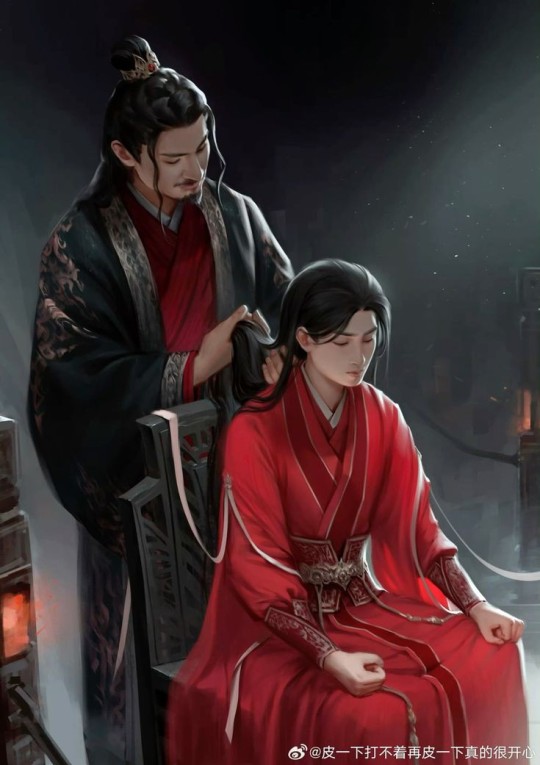
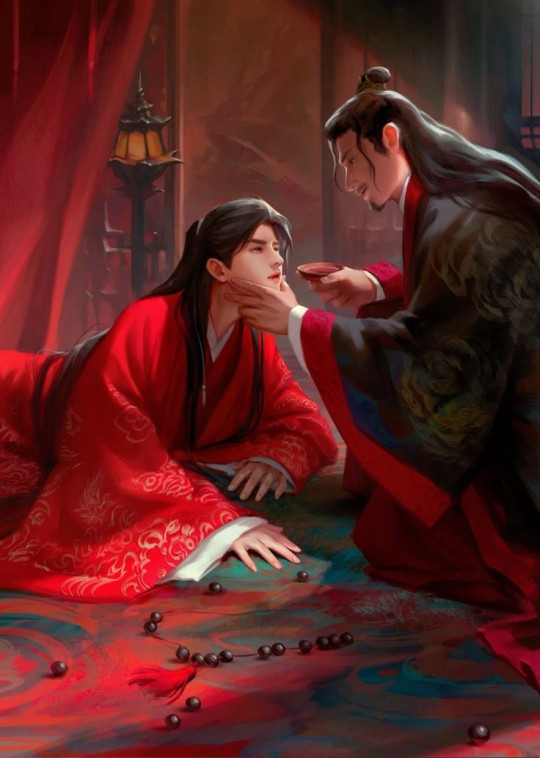

Tell me i'm not the only one
(credit to the artists)
#mysterious lotus casebook#li xiangyi#li lianhua#cheng yi#shan gudao#the ship between them makes me crazy#shan gudao is obsessed with li xiangyi since they were young#and i think he wants to break him to keep him like jiao liqiao to di feisheng#shan gudao is a crazy moterfuker#and i want i fic about it#cdrama#mlc#chinese drama#di feisheng#fang duobing
90 notes
·
View notes
Text
Going a little insane about how clever bringing in the question of Shan Gudao's cloud iron armour and Li Xiangyi's cloud iron sword is. It immediately dredges up such gut-punching parallels. On one hand there's Fang Duobing being lied to by Li Lianhua and well aware of it. Li Xiangyi's sword might have been the only thing that could kill Shan Gudao, and the doubt in Fang Duobing's mind grows heavier because it immediately raises the possibility that those lies are hiding something much more sinister than a man running from his past. And on the other hand, there is Li Xiangyi being lied to by Shan Gudao all those years ago and doubting him. Once again, doubting his shixiong implies the possibility of him doing terrible things like child murder for very unrighteous and selfish reasons.
And the choice to juxtapose these two betrayals of trust in the lead-up to the Li Xiangyi reveal!! The way Fang Duobing doubles down and demands honesty, while Li Xiangyi mostly took his shixiong at face value despite his misgivings. The way it dooms Li Lianhua to either lose Fang Duobing for good, or finally face the possibility that his shixiong was not the person he has let himself believe. The way Fang Duobing eventually chooses Li Lianhua as his lies were hurtful but never sinister, but Li Lianhua goes on to find out that Shan Gudao's betrayal is what doomed everything then and now.
#im pretty sure I'll disagree with myself on some points in a bit but had to scream this into the void first sigh#if i think too hard about betrayal and trust in mlc I'll combust#mysterious lotus casebook#lily's mlc rewatch#li lianhua#li xiangyi#fang duobing#shan gudao
105 notes
·
View notes
Text
There's a saying somewhere on the cn fandom that 如果角姐是戀愛腦,李相夷便是師兄腦 (if jiao liqiao is love brain, Li Xiangyi was shixiong brain) and like it's so true tho. Like we as a random do not talk about just how much Li Xiangyi/Li Lianhua loved his shixiong, even outside the obvious "spending his remaining 10 years with the one goal of finding his shixiong's remains and immediately giving up on fighting against death after finding sgd to the extent where dfs had to bring out the big guns to get llh to continue living for a while".
There's way too many stuff I could talk about but I'll briefly talk about Wenjing. As depicted in canon, Wenjing was sgd's 18th birthday present for lxy, made from Yun Metal (not that lxy knew it at the time). The name of the sword itself says a lot about lxy's love for his shixiong. Wenjing (刎頸)refers to the phrase 刎頸之交, aka "a friendship/relationship one would slit their throat for, referring to friendships where one would willingly and gladly lay down their life for the other". Li Xiangyi is the one who names this sword, and he directly references this phrase when naming the sword. One could say wenjing was a symbol of just how much sgd meant to lxy.
So how much does wenjing mean to Li Xiangyi/Li Lianhua? Going off canon, lxy was a bit of a peacock, and he liked to show off things he deemed impressive, yet for things that were actually really important to him, such as his love for cheap candy, he kept close to his chest. So what about Wenjing? It's a beautiful sword, and very well made, but Li Xiangyi never showed it off to anyone and kept it extremely private, because in his opinion, sgd's gift was something he wanted to keep just for himself. As top of the Jianghu, a lot of him was shown to the public and under public scrutiny, everything about him placed on the spotlight, placed on a pedestal, yet lxy was possessive enough over this sword to keep it to himself, like a secret only his shixiong and himself would know.
And then there's lxy always keeping wenjing on him even during his years as llh. As lxy, he had shaoshi as a sword already, and he didn't need another sword on him, not really, because he's proven that even disarmed he's not defenseless, but he kept wenjing on him anyway, because it was probably a symbol of his shixiong's love for him. And as llh, he would continue keeping the sword on him, despite being a wandering doctor who supposedly knew no martial arts and would be too poor to have such a beautiful sword.
And finally, llh chose to destroy shaoshi instead of using it to end himself (it's canon he literally said to shaoshi "using you to end me is rather inappropriate"), but despite wenjing later being revealed as, in fact, a sign of sgd's betrayal and hate of llh, llh never destroyed that it. He did throw it into a cliff face so no one could ever reach it again (low key excalibur situation hmn), but in my mind, it wasn't ever an action of hate against sgd, not a rejection of his gift, but rather llh throwing wenjing away from himself before he could actually get really mad and destroy this gift from his shixiong. He might have left wenjing behind when he went off to die, but we all know Llh's love language is abandonment.
#mysterious lotus casebook#li lianhua#li xiangyi#lian hua lou#Shan gudao#Mlc meta#Daohua#Is daohua a thing on tumblr idk prob not but I'm going to be insane about it anyway#Somebody go crazy over daohua with me pls#Its just. Lxy loved sgd so much. He was so devoted to sgd he'd literally live for him#And I think sgd knew that. In the end#Sgd was always gambling a little with whether or not lxy loved him honestly#And I think he got his answer that yes his shidi was utterly in love with him and devoted to him in the end#And that kind of hurts even more
70 notes
·
View notes
Text
So... AS USUAL, approaching scary deadline immediately sends my brain into overdrive writing mode, so EVERY FIC IDEA I've had for the past oh... 3-6 months or so has come STREAMING OUT OF MY BRAIN every time I sit down at my computer. OTZ
Which is to say that there will be about 2K+ words of TRULY ill-advised (yet... honestly pretty consensual if you ignore the inherent power imbalance of LLH being chained up in a dungeon) daohua prison sex coming your way in another day or two when I have time to do some edits.
...hope someone other than me is feeling that. 😅
#mysterious lotus casebook#shan gudao#li lianhua#li lianhua x shan gudao#daohua#eirenical writes things
33 notes
·
View notes
Text
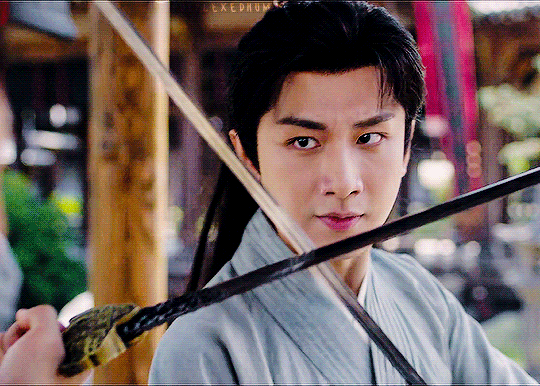
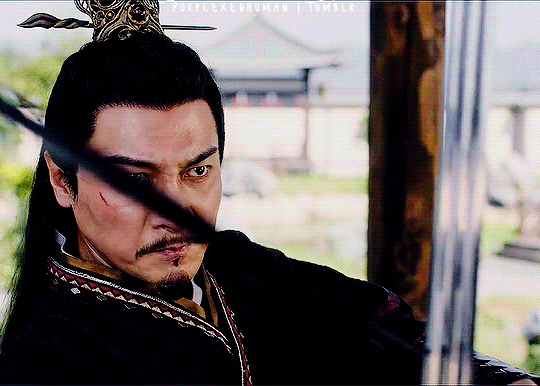
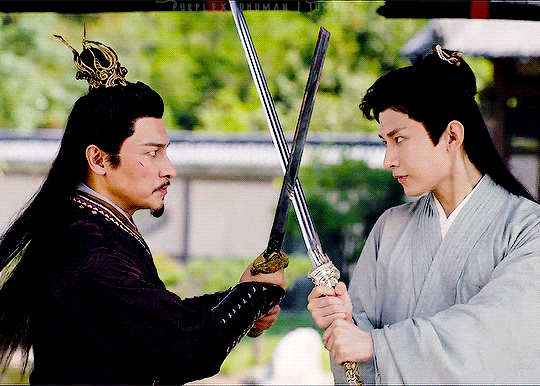

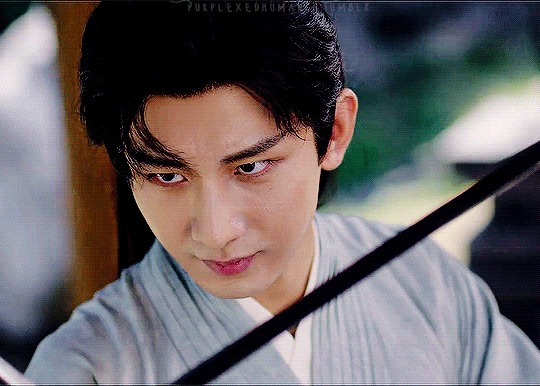
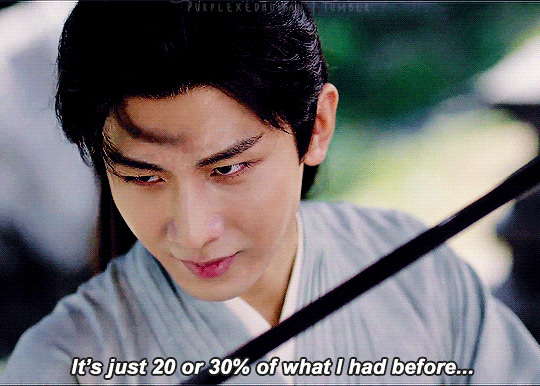
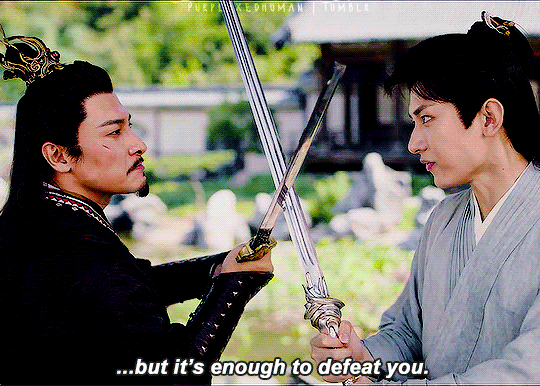
There's no need to go all out to defeat you.
Mysterious Lotus Casebook (莲花楼) Episode 39
#i am weak for the way he smirks while he fights... help#cdramaedit#cdramasource#dailyasiandramas#asiandramaedit#mysterious lotus casebook#cdrama#dramasource#li xiangyi#li lianhua#cheng yi#mysteriouslotuscasebookedit#莲花楼#shan gudao#lianhua lou#lilianhuaedit#lixiangyiedit#mlc 1x39#mysterious lotus casebook spoilers#my posts#my edits#my gifs
238 notes
·
View notes
Text
NARRATIVE FOIL THIS NARRATIVE FOIL THAT HOW ABOUT DI FEISHENG AND SHAN GUDAO ARE NARRATIVE FOILS BECAUSE BOTH WERE MALADJUSTED KIDS WHOSE CARETAKERS WEREN'T GREAT AT CARETAKING THEM AND THEY GREW INTO MARTIAL ARTS ADDICTS WHO WERE DETERMINED TO BE THE BEST EXCEPT DI FEISHENG DESPITE LITERALLY BEING THE ONE RAISED IN A DEATH CULT STILL DEVELOPED THE MORAL COMPASS TO PLAY FAIR WITH LI XIANGYI AND SIGN A PEACE TREATY WHEREAS SHAN GUDAO'S DEEPLY-ROOTED INFERIORITY COMPLEX DROVE HIM TO JUST MANIPULATE EVERYONE INTO WARFARE INCLUDING HIS OWN BROTHER
#“caretaker” for di feisheng listen work with me here#di feisheng#li xiangyi#li lianhua#shan gudao#tears falling like peridots#mlc#mysterious lotus casebook#lhl#lian hua lou
120 notes
·
View notes
Text
ok, i'm gonna do it, i'm gonna be brave and ask the really difficult questions that no one else cares about.
38 notes
·
View notes
Text
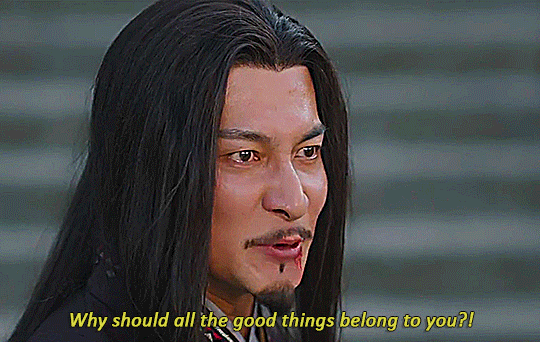
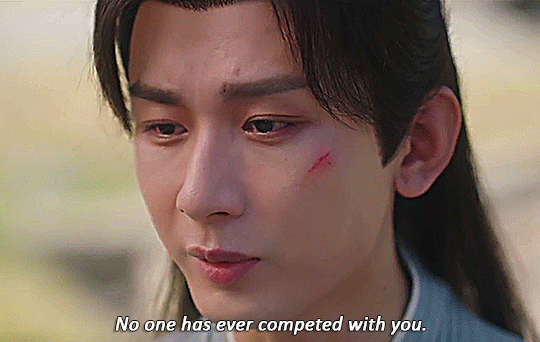
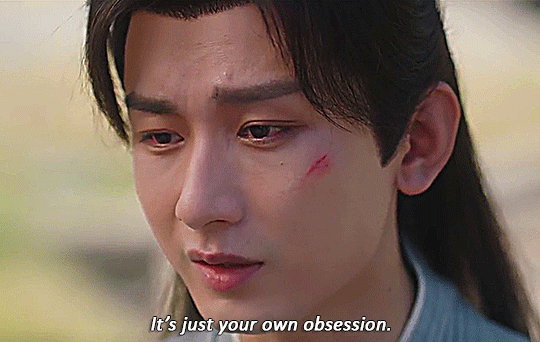
Li Lianhua + saying "You were my brother, Shan Gudao, I loved you" without saying "I love you" (4/?)
Mysterious Lotus Casebook (2023)
#li lianhua#mysterious lotus casebook#lhl#lian hua lou#shan gudao#mlc#I never realized how Star Wars this moment was until I dug into this gifset + series#maybe that's another reason why this scene absolutely Broke Me#because even though shan gudao's character got a little (a lot) unhinged#there is still the tragedy of their broken relationship#there's the tragedy of li lianhua looking back on his entire life and wondering if the love was ever there...#btw this reminds me of a gorgeous MLC fic I'm reading by yletylyf#(I hope you see this!!)#check it out on their ao3 page!!#okay bye going to cry forever over llh my favorite sad babygirl blorbo#llh's love language#my mlc gifs
41 notes
·
View notes
Text
Dance with the ghost

I'm thinking again about the theme of ghosts in Mysterious Lotus casebook, and I'm inclined to think that it's not really about physical death. But about social death. The word ghost appears many times throughout the drama.

But the real ghosts in the drama are ghosts in the same sense as in The Word of Honor. Rejected by society. People invisible to society. Or people whose suffering is invisible to society.

In every case under investigation there are such people - women captured by a tyrant, strange people, disabled people, people with mental disorders, people with unusual appearance, injuries.



By investigating the cases, Li Lianhua and Fang Duobing make these people visible. First of all, thanks to Li Lianhua's gift of seeing. But Fang Duobing also has the prerequisites for developing this ability - from the very beginning he sees Li Lianhua, his first "ghost" . And then through it he learns to see others.
By choosing the life of a ghost, Li Lianhua becomes susceptible to the lives of other ghosts. But he is still afraid of becoming a "lonely wild ghost" - someone who no one sees and who cannot be at peace with himself.

He goes through the journey, plunging into the world of ghosts and becoming imbued with sympathy and understanding for them.
In this context, the theme of the ghostly marriage of Li Lianhua and Di Feisheng is also not about death and doom. On the one hand, it emphasizes the fact that they are both “ghosts”, in this metaphorical social sense.

On the other hand… this can also be seen as a metaphor for queer relations in conservative countries. When two people live as spouses, but for society their marriage is “ghostly”, invisible.
And even queercoded love stories in dramas end up being “ghostly”. They are seen only by those who are able to see, but for everyone else they seem to be absent.


So the relationship between Li Lianhua and Di Feisheng is ghostly, because society does not accept their union.


But there is another side to the ghost theme. Who are the real restless spirits in this drama? Ghosts that exist beyond the boundaries of society? Or those who are struggling to establish themselves in this society?
The ones who behave most like ghosts in this drama are the antagonists. They strive for one goal with such obsession, as if having achieved it they will be able to become real.


But they do not feel contact with themselves or with others. Therefore, their thirst for existence cannot be satisfied.
They get power - but it seems to them not enough. They receive love - but love makes them visible, which is unbearable for them, so they destroy everyone who loves them.


Shang Gudao received all the teacher's power, but it did not help him win. Because he didn't even remember the first lessons. Because he had never really seen the teacher, but Li Xiangyi had.
The ability to see and be seen is precisely what makes a person real.

But if the connection with someone or with a whole society becomes too destructive, unbearable, a person may choose to become invisible to others in order to remain real to himself.

Is this flight or protest? Maybe both. One thing is for sure - this is a failure for society.
As for the person himself... sometimes one or two people who really see you are enough to exist.
#mysterious lotus casebook#li lianhua#di feisheng#li xiangyi#fang duobing#shan gudao#jiao liqiao#dihua#mlc meta
35 notes
·
View notes
Text








goodbye li xiangyi
though i never knew you at all
#mysterious lotus casebook#li xiangyi#fang duobing#li lianhua#shan gudao#sorry i've been listening to the best of elton john cd too much recently#not that this is like the best of elton john or even the most sad of elton john#if you catch me making an lxy&sgd edit to daniel that's when you know i've lost my mind#there's a version of this in my head with high quality gifs and beautiful typesetting#but i know that if i ever get round to installing photoshop mlc will not be the first show i try to get a high quality torrent of#so i figured its better to do it half-assed than not at all#angsty screenshot edits
68 notes
·
View notes
Text
Today, I’m crying about Li Xiangyi’s childhood, the way it taught him that losing meant he didn’t deserve to exist, and how that governed his response to the East Sea battle ten years earlier and to all the revelations at the end of the show.
Li Xiangyi obviously loves his shifu and shiniang, and they definitely loved him, too, given that his shifu wanted him to focus more on enjoying life and less on changing the world and obtaining victories, and given that his shifu sacrificed himself to try to save Xiangyi and his shiniang wanted to. So, his childhood with them definitely had more love, support, stability, and learning opportunities than his earlier life, which features such traumas as seeing his mom murdered in front of him, living on the streets starting at age 4, watching his older brother die in front of him and then forgetting his older brother existed, probably from traumatic amnesia/dissociation. That being said, though, his shiniang and shifu made some truly horrific decisions that caused some epic problems for both Li Xiangyi and Shan Gudao! It’s not just that they withheld incredibly important knowledge about Xiangyi’s early life and background from him (who his parents were, why they were murdered, that he had an older brother, the secret of his heritage)--although wow, that is a terrible way to raise a traumatized child–it’s also that they fostered competition instead of caring, both with the children they raised and between each other. I’m thinking in particular of the fact that, once shiniang and shifu separated, they each took a child (based on drawing lots) and had Xiangyi and Shan Gudao fight once a month to determine not just which kid was the better martial artist, but which adult was a better teacher, and, by extension, parent and person!
That last thing is just so infuriating and, frankly, abusive: it makes each kid think competition and winning is how affection is earned, and that any sort of mistake or loss or failure is the absolute end of the world, because you’re never just letting yourself down or not reaching your potential: you are proving that you don’t deserve their care and affection. It also taught Xiangyi that he was responsible for their caregiver’s happiness and reputation, and once you have that kind of overdeveloped sense of responsibility as a child, you carry it through into every aspect of your life, because you don’t know any other way of being. No wonder Xiangyi thought he carried the world on his shoulders: growing up, the mountain home/training center was his world–since it seems like he didn’t have interactions with anyone else until he left the mountain at age 15–so he had been carrying that belief for at least a decade without having seen any other models of ways to exist.
Also, we know Xiangyi thinks he owes his shiniang and shifu for having brought him into their family: having that added sense of debt makes everything so much worse, because he essentially thinks he owes his entire existence to them. It seems like Xiangyi felt like he had to win the competitions to prove he deserved to be there, but also to prove he deserved to exist.
For his early life, he only felt the positive side of this expectation, because he never lost, since his martial arts skills were so much stronger than Shan Gudao’s. He was unintentionally primed to assume the outcome was a foregone conclusion, because he didn’t have any real challengers. This also hammered home the idea that he was right about things, that he should call the shots, and that collaboration wasn’t really relevant to his life, since it wasn’t as if his shifu taught Xiangyi and Shan Gudao how to fight side by side to defeat other opponents. Losing seemed like something that happened to other people (namely, Shan Gudao), and given the emphasis his shifu and shiniang placed on the competitions, I imagine winning time after time was more than just an adrenaline rush; it was positive reinforcement that he deserved the good things that had come his way, had repaid the debt he owed his shiniang and shifu, and would continue to earn love, respect, a family, a home, and a right to exist.
But when he lost? When he had never had a model for what losing safely feels like? (When the only times he lost were when he lost deliberately to try to cheer up Shan Gudao, but was berated for it, and told it was shameful and wrong to throw a fight for any reason, so losing becomes even more associated with shame?) When losing wasn’t a way to learn, but a sign that he might lose his love, his family, his home? What happens when the scaffolding upholding his right to exist—his ability to win—comes crashing down?
Suicidal ideation. Because he lost not only the battle with Di Feisheng, but also his shixiong, his shixiong’s body, his fiancee, the lives of his men, his reputation, his new home (the Sigu sect), and being able-bodied. In short, he lost everything part of him always feared he’d lose and then some. So why would he think he still has a right to exist, after that? How could he believe someone telling him it wasn’t his fault, when all he has ever known is that the responsibility for everyone he cares for lies with him?
(I feel like it’s really telling that he didn’t go back to his shiniang’s or shifu’s home after everything went to hell; he said it was because he had been unfilial and couldn’t bear to go back after his shifu died, but it also seems like, given that he had lost everything else, he felt like he didn’t deserve the comfort, family, and home it represented, so staying away is his punishment.)
Given all this, it makes total sense that Li Lianhua wants so desperately to think of Li Xiangyi as dead: he can’t actually reconcile being alive and having failed. So he tries to create a new persona that doesn’t want to be the best in the jianghu or thrive on praise and responsibility, while he tries to correct what he thinks of as his mistakes, before he dies of Bicha poisoning.
He tries to live the life his shifu wanted for him, where he enjoys pleasures like wine, food, relaxation, and growing things instead of focusing on making a name for himself or winning, and he tries to stay away from people, attachments, and love, because you can’t lose them again if you don’t have them to begin with.
But of course, saying someone is a different person doesn’t make it so. He still wants to be the best–the best physician, the best at scheming, the best at detective work–because he still doesn’t actually know how to be any other way. So he still has the same problems as Li Xiangyi: he still withholds information and commands more than collaborates (it’s frankly amazing he works as well with Fang Duobing and Di Feisheng as he does), still has an overdeveloped sense of responsibility (he believes he has to be the one to save those he cares about and stop everyone else, whether Shan Gudao or the emperor), and at the end, is still suicidal (because now he thinks he’s responsible for the death of his shifu, for not seeing Shan Gudao’s plot, and probably in some warped way for the Nanyin situation once he learns the truth of his heritage, because the man has never met a situation he can’t take the blame for).
It doesn’t surprise me at all that Li Lianhua doesn’t fully get how much he means to Di Feisheng and Fang Duobing at the end, or that he thinks they just want their version of Li Xiangyi: he can’t imagine being loved and still having made a mistake.
#mysterious lotus casebook#mysterious lotus casebook meta#li xiangyi#li lianhua#tw: suicide#Shan Gudao#I had more to say about how LXY loses everything once and decides he deserves nothing#while Shan Gudao lost every day for a decade and decided he deserved everything#and how both maladaptive coping strategies are from the absurd competition they grew up with#but it was already too long#so it's going here#some day I will actually finish my fics and post them#but for now it's meta time
124 notes
·
View notes
Text
There's something about how Di Feisheng survives, spends a decade with the knowledge of Li Xiangyi's death, struggles to see the shape of a future without him, while Li Xiangyi does exactly the same for Shan Gudao. How Di Feisheng without Li Xiangyi would most likely have gone back to a joyless life of relentlessly pursuing power to survive, and how Li Xiangyi without Shan Gudao builds himself a new, peaceful existence that nevertheless leaves him as alone as before, that has only death after the relentless pursuit of correcting his incorrigible wrongs as best as he can. How Di Feisheng finds Li Xiangyi, alive but intent on dying, barely recognisable. How Li Xiangyi finds Shan Gudao alive, twisted beyond recognition, and is forced to face that he never really knew the man. How Di Feisheng slowly and surely comes to care for Li Lianhua, Li Xiangyi, whoever he is, while Li Xiangyi can only allow himself to feel grief and rage at Shan Gudao. In the end, Li Xiangyi must kill the one whose death he has spent a decade mourning, and Di Feisheng is left waiting for a match that will never come. When you build a life around one person, what else is left once they are gone? Do you leave the rest behind, or do you keep looking?
#making sgd-lxy and lxy-dfs parallels might just become a brand new hobby of mine#li xiangyi#li lianhua#di feisheng#shan gudao#mysterious lotus casebook#meta
76 notes
·
View notes
Text
The way there's other occasions in the og lianhualou script where Li Lianhua is described to lose control of his emotions and get really mad like he did against Shan Gudao during the cliff fight scene but it's not really in the drama
On one hand it shows just how important sgd is to llh that he's the only one to truly truly evoke explosive anger from llh and not just the cold anger he normally has, but I'm pretty sure Cheng yi made use of the creative freedom he had in to the show and suggested changing the script (there's reuters during filming where cy was enthusiastically discussing the script with the director he was gesturing to the script and everything) to fit novel Llh's polite and gentle sort of detachment.
#Everybody say thank you cy lol#mysterious lotus casebook#li lianhua#li xiangyi#lian hua lou#cheng yi#Shan gudao#Mlc meta
49 notes
·
View notes